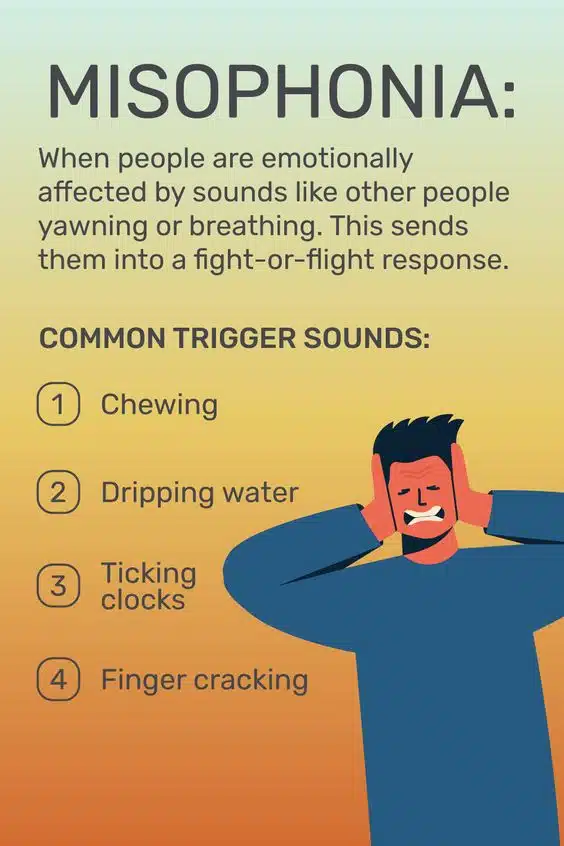If you’re a parent of a child with misophonia, you may have heard the term but don’t quite understand what it means. “Miso” is Greek for hatred or dislike and “phonia” refers to sound. Put them together, and voila! You get misophonia – an audio-sensitive disorder that can affect a person’s quality of life in many ways. Read on as we take a closer look into the causes and symptoms of misophonia. Take our brief misophonia test for kids below!
Table of Contents
Have you ever noticed that a specific sound, like someone chewing or breathing loudly, can send you into a fight or flight response? If so, this may be more than just annoyance – it could be something called misophonia. Misophonia is a disorder of sound perception where people have extreme emotional reactions like irritation, anger, or even rage when they hear specific sounds.
Misophonia is triggered by different sounds for different people. Some people may be triggered by sounds like chewing, whistling, or even nasal breathing sounds. People with misophonia often also have a sensory processing disorder, which is common in individuals with ASD. Misophonia can result in emotional reactions such as anxiety or anger and can even cause physical symptoms like headaches and an increased heart rate.
Causes of Misophonia
Researchers don’t know exactly why some people have misophonia. Some people think it has something to do with a part of the brain called the limbic system. This controls feelings like fear and pleasure. Others think that it happens when part of the auditory cortex (which is responsible for sound processing) doesn’t work the way it should.

Misophonia Symptoms
Misophonia, a condition where people experience intense emotional responses to certain sounds, can occur at any stage of life, but typically presents itself around the ages of 8-13. Unfortunately, children with misophonia usually don’t receive a diagnosis because of their age. Symptoms include irritability, avoidance of activities involving the trigger sound, and aggressive behavior toward people making the sounds. In severe cases, individuals may even experience physical symptoms like clenched fists or teeth grinding. If you think you may have misophonia, try taking our brief misophonia test below!
Comorbid Conditions | Misophonia Test Below
People with OCD, autism, and anxiety are likely to experience misophonia more intensely than others. The heightened emotional state that comes with these conditions can often lead to increased sensitivity to external stimuli. For people with OCD, anxiety, or ASD, it can be challenging to cope with triggers that cause strong reactions.

Read More: What is ADHD Paralysis?
If you or your child experience misophonia, you understand the intense emotional reactions that certain sounds can trigger. These reactions make it challenging to concentrate on tasks and can lead to feelings of irritation or anger. For individuals with OCD, controlling thoughts and emotions in response to these triggers can be particularly difficult, heightening the misophonic response.
Misophonic sounds can be overwhelming for those with anxiety or autism. Individuals on the autism spectrum may struggle with self-regulation, and these triggers can exacerbate their difficulties. Similarly, individuals with anxiety may find the unpredictable nature of sound cues to be distressing, leading to feelings of fear and panic that further intensify their misophonic reactions. Recognizing these factors can help parents better understand and support their children who experience misophonia, creating a more supportive and understanding environment.
Misophonia Test & Treatment
Have you taken our misophonia test? Treatment options are typically geared towards managing symptoms rather than directly treating them. Misophonia doesn’t have a “one size fits all” solution. But there are several strategies to help people cope with their triggers. Cognitive-behavioral therapy (CBT) and counseling can teach individuals how to control stress levels when faced with these triggers. Biofeedback and relaxation techniques might also be helpful in dealing with the issue. Exposure therapy works by gradually exposing someone to their triggers so they become more tolerant over time.
When you have misophonia, certain sounds can have a huge impact on your daily life. The emotional and physical reactions to triggers can be so intense that it may lead to avoiding certain places, like work or school, to escape the sounds. Unfortunately, this can lead to feelings of guilt and shame because you can’t control your reactions.
Goally | 100+ Streaming Video Classes
Does your child need some extra guidance on building essential life skills? Goally’s skill building tablet for kids includes a TV app that has the most robust video library of skills training videos for kids. Ranging from content like “How to Brush Your Teeth” to “How to Make Friends at School,” we have dozens of interactive video lessons for kids with thinking and learning differences.

HERE’s a video explaining how to works.
Overall, misophonia is a disorder closely related to sensory processing disorder, commonly experienced among people with ASD. Continue reading for our misophonia test for kids! It involves strong emotional responses triggered by certain sounds along with physical symptoms such as rapid heart rate and headaches. While there is no known cure for misophonia, treatments are available that help people manage their symptoms and reduce stress levels. Finally, it can significantly impact a person’s daily life leading them to have difficulty interacting socially or completing tasks at work or school due to its disruptive nature.
This post was originally published on 01/30/2023. It was updated on 11/17/2023.

Goally
We help parents teach their kids life skills, like doing bedtime and morning independently. Backed by science, we incorporate evidence-based practices and expert-informed designs in all of our apps and content.






